Observable Factory¶
- reactivex.amb(*sources)¶
Propagates the observable sequence that emits first.
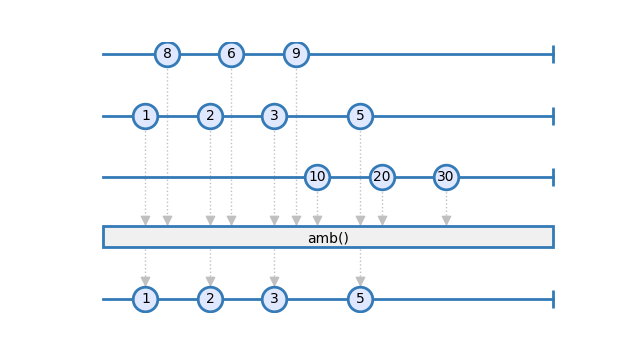
Example
>>> winner = reactivex.amb(xs, ys, zs)
- Parameters
sources (
Observable[TypeVar(_T)]) – Sequence of observables to monitor for first emission.- Return type
Observable[TypeVar(_T)]- Returns
An observable sequence that surfaces any of the given sequences, whichever emitted the first element.
- reactivex.case(mapper, sources, default_source=None)¶
Uses mapper to determine which source in sources to use.
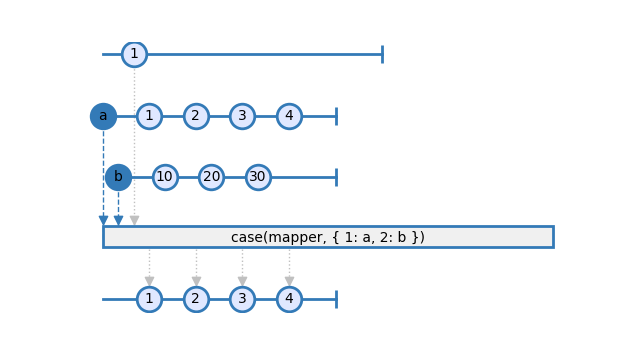
Examples
>>> res = reactivex.case(mapper, { '1': obs1, '2': obs2 }) >>> res = reactivex.case(mapper, { '1': obs1, '2': obs2 }, obs0)
- Parameters
mapper – The function which extracts the value for to test in a case statement.
sources – An object which has keys which correspond to the case statement labels.
default_source – [Optional] The observable sequence or Future that will be run if the sources are not matched. If this is not provided, it defaults to
empty().
- Returns
An observable sequence which is determined by a case statement.
- reactivex.catch(*sources)¶
Continues observable sequences which are terminated with an exception by switching over to the next observable sequence.
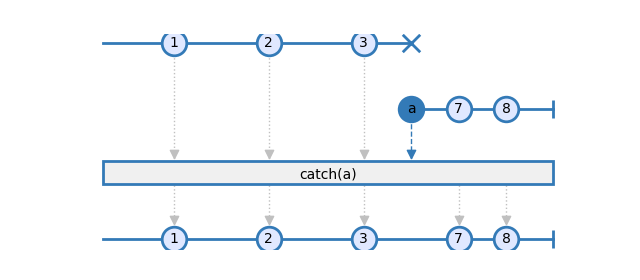
Examples
>>> res = reactivex.catch(xs, ys, zs)
- Parameters
sources (
Observable[TypeVar(_T)]) – Sequence of observables.- Return type
Observable[TypeVar(_T)]- Returns
An observable sequence containing elements from consecutive observables from the sequence of sources until one of them terminates successfully.
- reactivex.catch_with_iterable(sources)¶
Continues observable sequences that are terminated with an exception by switching over to the next observable sequence.

Examples
>>> res = reactivex.catch([xs, ys, zs]) >>> res = reactivex.catch(src for src in [xs, ys, zs])
- Parameters
sources (
Iterable[Observable[TypeVar(_T)]]) – An Iterable of observables; thus, a generator can also be used here.- Return type
Observable[TypeVar(_T)]- Returns
An observable sequence containing elements from consecutive observables from the sequence of sources until one of them terminates successfully.
- reactivex.create(subscribe)¶
- Creates an observable sequence object from the specified
subscription function.

- Parameters
subscribe (
Callable[[ObserverBase[TypeVar(_T)],Optional[SchedulerBase]],DisposableBase]) – Subscription function.- Return type
Observable[TypeVar(_T)]- Returns
An observable sequence that can be subscribed to via the given subscription function.
- reactivex.combine_latest(*__sources)¶
Merges the specified observable sequences into one observable sequence by creating a tuple whenever any of the observable sequences emits an element.
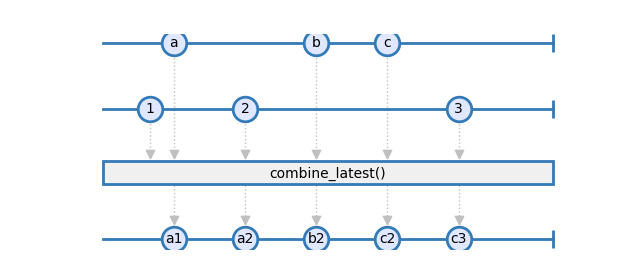
Examples
>>> obs = rx.combine_latest(obs1, obs2, obs3)
- Parameters
sources – Sequence of observables.
- Return type
Observable[Any]- Returns
An observable sequence containing the result of combining elements from each source in given sequence.
- reactivex.compose(*operators)¶
Compose multiple operators left to right.
Composes zero or more operators into a functional composition. The operators are composed to left to right. A composition of zero operators gives back the source.
Examples
>>> pipe()(source) == source >>> pipe(f)(source) == f(source) >>> pipe(f, g)(source) == g(f(source)) >>> pipe(f, g, h)(source) == h(g(f(source))) ...
- Return type
Callable[[Any],Any]- Returns
The composed observable.
- reactivex.concat(*sources)¶
Concatenates all of the specified observable sequences.
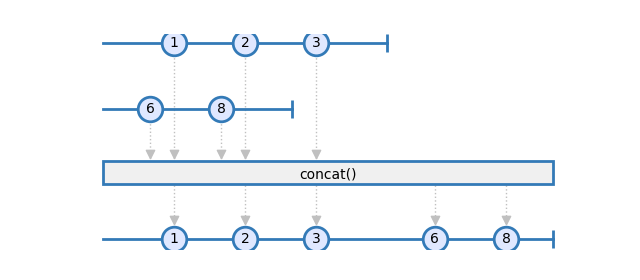
Examples
>>> res = reactivex.concat(xs, ys, zs)
- Parameters
sources (
Observable[TypeVar(_T)]) – Sequence of observables.- Return type
Observable[TypeVar(_T)]- Returns
An observable sequence that contains the elements of each source in the given sequence, in sequential order.
- reactivex.concat_with_iterable(sources)¶
Concatenates all of the specified observable sequences.

Examples
>>> res = reactivex.concat_with_iterable([xs, ys, zs]) >>> res = reactivex.concat_with_iterable(for src in [xs, ys, zs])
- Parameters
sources (
Iterable[Observable[TypeVar(_T)]]) – An Iterable of observables; thus, a generator can also be used here.- Return type
Observable[TypeVar(_T)]- Returns
An observable sequence that contains the elements of each given sequence, in sequential order.
- class reactivex.ConnectableObservable(source, subject)¶
Represents an observable that can be connected and disconnected.
- __init__(source, subject)¶
Creates an observable sequence object from the specified subscription function.
- Parameters
subscribe – [Optional] Subscription function
- connect(scheduler=None)¶
Connects the observable.
- Return type
Optional[DisposableBase]
- auto_connect(subscriber_count=1)¶
Returns an observable sequence that stays connected to the source indefinitely to the observable sequence. Providing a subscriber_count will cause it to connect() after that many subscriptions occur. A subscriber_count of 0 will result in emissions firing immediately without waiting for subscribers.
- Return type
Observable[TypeVar(_T)]
- reactivex.defer(factory)¶
Returns an observable sequence that invokes the specified factory function whenever a new observer subscribes.

Example
>>> res = reactivex.defer(lambda scheduler: of(1, 2, 3))
- Parameters
factory – Observable factory function to invoke for each observer which invokes
subscribe()on the resulting sequence. The factory takes a single argument, the scheduler used.- Returns
An observable sequence whose observers trigger an invocation of the given factory function.
- reactivex.empty(scheduler=None)¶
Returns an empty observable sequence.

Example
>>> obs = reactivex.empty()
- Parameters
scheduler (
Optional[SchedulerBase]) – [Optional] Scheduler instance to send the termination call on. By default, this will use an instance ofImmediateScheduler.- Return type
Observable[Any]- Returns
An observable sequence with no elements.
- reactivex.fork_join(*sources)¶
Wait for observables to complete and then combine last values they emitted into a tuple. Whenever any of that observables completes without emitting any value, result sequence will complete at that moment as well.
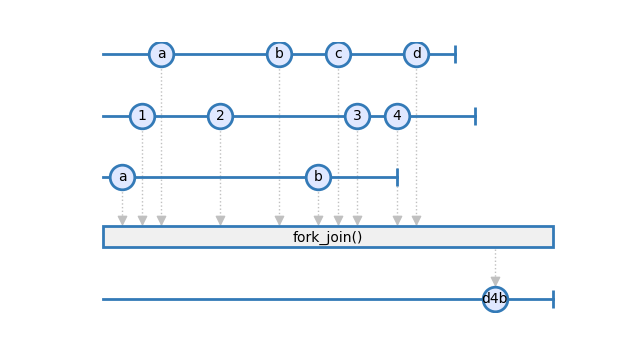
Examples
>>> obs = reactivex.fork_join(obs1, obs2, obs3)
- Parameters
sources (
Observable[Any]) – Sequence of observables.- Return type
Observable[Any]- Returns
An observable sequence containing the result of combining last element from each source in given sequence.
- reactivex.from_callable(supplier, scheduler=None)¶
Returns an observable sequence that contains a single element generated by the given supplier, using the specified scheduler to send out observer messages.

Examples
>>> res = reactivex.from_callable(lambda: calculate_value()) >>> res = reactivex.from_callable(lambda: 1 / 0) # emits an error
- Parameters
supplier (
Callable[[],TypeVar(_T)]) – Function which is invoked to obtain the single element.scheduler (
Optional[SchedulerBase]) – [Optional] Scheduler instance to schedule the values on. If not specified, the default is to use an instance ofCurrentThreadScheduler.
- Return type
Observable[TypeVar(_T)]- Returns
An observable sequence containing the single element obtained by invoking the given supplier function.
- reactivex.from_callback(func, mapper=None)¶
Converts a callback function to an observable sequence.
- Parameters
func (
Callable[...,Callable[...,None]]) – Function with a callback as the last argument to convert to an Observable sequence.mapper (
Optional[Callable[[Any],Any]]) – [Optional] A mapper which takes the arguments from the callback to produce a single item to yield on next.
- Return type
Callable[[],Observable[Any]]- Returns
A function, when executed with the required arguments minus the callback, produces an Observable sequence with a single value of the arguments to the callback as a list.
- reactivex.from_future(future)¶
Converts a Future to an Observable sequence

- Parameters
future – A Python 3 compatible future. https://docs.python.org/3/library/asyncio-task.html#future
- Returns
An observable sequence which wraps the existing future success and failure.
- reactivex.from_iterable(iterable, scheduler=None)¶
Converts an iterable to an observable sequence.

Example
>>> reactivex.from_iterable([1,2,3])
- Parameters
iterable (
Iterable[TypeVar(_T)]) – An Iterable to change into an observable sequence.scheduler (
Optional[SchedulerBase]) – [Optional] Scheduler instance to schedule the values on. If not specified, the default is to use an instance ofCurrentThreadScheduler.
- Return type
Observable[TypeVar(_T)]- Returns
The observable sequence whose elements are pulled from the given iterable sequence.
- class reactivex.GroupedObservable(key, underlying_observable, merged_disposable=None)¶
- __init__(key, underlying_observable, merged_disposable=None)¶
Creates an observable sequence object from the specified subscription function.
- Parameters
subscribe – [Optional] Subscription function
- reactivex.never()¶
Returns a non-terminating observable sequence, which can be used to denote an infinite duration (e.g. when using reactive joins).

- Return type
Observable[Any]- Returns
An observable sequence whose observers will never get called.
- class reactivex.Notification¶
Represents a notification to an observer.
- __init__()¶
Default constructor used by derived types.
- accept(on_next, on_error=None, on_completed=None)¶
Invokes the delegate corresponding to the notification or an observer and returns the produced result.
Examples
>>> notification.accept(observer) >>> notification.accept(on_next, on_error, on_completed)
- Parameters
on_next (
Union[Callable[[TypeVar(_T)],None],ObserverBase[TypeVar(_T)]]) – Delegate to invoke for an OnNext notification.on_error (
Optional[Callable[[Exception],None]]) – [Optional] Delegate to invoke for an OnError notification.on_completed (
Optional[Callable[[],None]]) – [Optional] Delegate to invoke for an OnCompleted notification.
- Return type
None- Returns
Result produced by the observation.
- to_observable(scheduler=None)¶
Returns an observable sequence with a single notification, using the specified scheduler, else the immediate scheduler.
- Parameters
scheduler (
Optional[SchedulerBase]) – [Optional] Scheduler to send out the notification calls on.- Return type
ObservableBase[TypeVar(_T)]- Returns
An observable sequence that surfaces the behavior of the notification upon subscription.
- equals(other)¶
Indicates whether this instance and a specified object are equal.
- Return type
bool
- __eq__(other)¶
Return self==value.
- Return type
bool
- __hash__ = None¶
- reactivex.on_error_resume_next(*sources)¶
Continues an observable sequence that is terminated normally or by an exception with the next observable sequence.
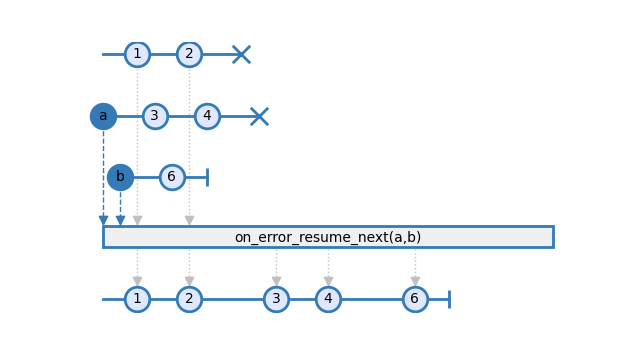
Examples
>>> res = reactivex.on_error_resume_next(xs, ys, zs)
- Parameters
sources – Sequence of sources, each of which is expected to be an instance of either
ObservableorFuture.- Returns
An observable sequence that concatenates the source sequences, even if a sequence terminates with an exception.
- reactivex.of(*args)¶
This method creates a new observable sequence whose elements are taken from the arguments.

Note
This is just a wrapper for
reactivex.from_iterable(args)Example
>>> res = reactivex.of(1,2,3)
- Parameters
args (
TypeVar(_T)) – The variable number elements to emit from the observable.- Return type
Observable[TypeVar(_T)]- Returns
The observable sequence whose elements are pulled from the given arguments
- class reactivex.Observable(subscribe=None)¶
Observable base class.
Represents a push-style collection, which you can
pipeintooperators.- __init__(subscribe=None)¶
Creates an observable sequence object from the specified subscription function.
- Parameters
subscribe (
Optional[Callable[[ObserverBase[TypeVar(_T_out, covariant=True)],Optional[SchedulerBase]],DisposableBase]]) – [Optional] Subscription function
- subscribe(on_next=None, on_error=None, on_completed=None, *, scheduler=None)¶
Subscribe an observer to the observable sequence.
You may subscribe using an observer or callbacks, not both; if the first argument is an instance of
Observeror if it has a (callable) attribute namedon_next, then any callback arguments will be ignored.Examples
>>> source.subscribe() >>> source.subscribe(observer) >>> source.subscribe(observer, scheduler=scheduler) >>> source.subscribe(on_next) >>> source.subscribe(on_next, on_error) >>> source.subscribe(on_next, on_error, on_completed) >>> source.subscribe(on_next, on_error, on_completed, scheduler=scheduler)
- Parameters
observer – [Optional] The object that is to receive notifications.
on_error (
Optional[Callable[[Exception],None]]) – [Optional] Action to invoke upon exceptional termination of the observable sequence.on_completed (
Optional[Callable[[],None]]) – [Optional] Action to invoke upon graceful termination of the observable sequence.on_next (
Union[ObserverBase[TypeVar(_T_out, covariant=True)],Callable[[TypeVar(_T_out, covariant=True)],None],None]) – [Optional] Action to invoke for each element in the observable sequence.scheduler (
Optional[SchedulerBase]) – [Optional] The default scheduler to use for this subscription.
- Return type
DisposableBase- Returns
Disposable object representing an observer’s subscription to the observable sequence.
- pipe(*operators)¶
Compose multiple operators left to right.
Composes zero or more operators into a functional composition. The operators are composed from left to right. A composition of zero operators gives back the original source.
Examples
>>> source.pipe() == source >>> source.pipe(f) == f(source) >>> source.pipe(g, f) == f(g(source)) >>> source.pipe(h, g, f) == f(g(h(source)))
- Parameters
operators (
Callable[[Any],Any]) – Sequence of operators.- Return type
Any- Returns
The composed observable.
- run()¶
Run source synchronously.
Subscribes to the observable source. Then blocks and waits for the observable source to either complete or error. Returns the last value emitted, or throws exception if any error occurred.
Examples
>>> result = run(source)
- Raises
SequenceContainsNoElementsError – if observable completes (on_completed) without any values being emitted.
Exception – raises exception if any error (on_error) occurred.
- Return type
Any- Returns
The last element emitted from the observable.
- __await__()¶
Awaits the given observable.
- Return type
Generator[Any,None,TypeVar(_T_out, covariant=True)]- Returns
The last item of the observable sequence.
- __add__(other)¶
Pythonic version of
concat.Example
>>> zs = xs + ys
- Parameters
other (
Observable[TypeVar(_T_out, covariant=True)]) – The second observable sequence in the concatenation.- Return type
Observable[TypeVar(_T_out, covariant=True)]- Returns
Concatenated observable sequence.
- __iadd__(other)¶
Pythonic use of
concat.Example
>>> xs += ys
- Parameters
other (
Observable[TypeVar(_T_out, covariant=True)]) – The second observable sequence in the concatenation.- Return type
Observable[_T_out]
- Returns
Concatenated observable sequence.
- __getitem__(key)¶
Pythonic version of
slice.Slices the given observable using Python slice notation. The arguments to slice are start, stop and step given within brackets [] and separated by the colons :.
It is basically a wrapper around the operators
skip,skip_last,take,take_lastandfilter.The following diagram helps you remember how slices works with streams. Positive numbers are relative to the start of the events, while negative numbers are relative to the end (close) of the stream.
r---e---a---c---t---i---v---e---! 0 1 2 3 4 5 6 7 8 -8 -7 -6 -5 -4 -3 -2 -1 0
Examples
>>> result = source[1:10] >>> result = source[1:-2] >>> result = source[1:-1:2]
- Parameters
key (
Union[slice,int]) – Slice object- Return type
Observable[TypeVar(_T_out, covariant=True)]- Returns
Sliced observable sequence.
- Raises
TypeError – If key is not of type
intorslice
- class reactivex.Observer(on_next=None, on_error=None, on_completed=None)¶
Base class for implementations of the Observer class. This base class enforces the grammar of observers where OnError and OnCompleted are terminal messages.
- __init__(on_next=None, on_error=None, on_completed=None)¶
- on_next(value)¶
Notify the observer of a new element in the sequence.
- Return type
None
- on_error(error)¶
Notify the observer that an exception has occurred.
- Parameters
error (
Exception) – The error that occurred.- Return type
None
- on_completed()¶
Notifies the observer of the end of the sequence.
- Return type
None
- dispose()¶
Disposes the observer, causing it to transition to the stopped state.
- Return type
None
- to_notifier()¶
Creates a notification callback from an observer.
Returns the action that forwards its input notification to the underlying observer.
- Return type
Callable[[Notification[TypeVar(_T_in, contravariant=True)]],None]
- as_observer()¶
Hides the identity of an observer.
Returns an observer that hides the identity of the specified observer.
- Return type
ObserverBase[TypeVar(_T_in, contravariant=True)]
- reactivex.return_value(value, scheduler=None)¶
Returns an observable sequence that contains a single element, using the specified scheduler to send out observer messages. There is an alias called ‘just’.

Examples
>>> res = reactivex.return_value(42) >>> res = reactivex.return_value(42, timeout_scheduler)
- Parameters
value (
TypeVar(_T)) – Single element in the resulting observable sequence.- Return type
Observable[TypeVar(_T)]- Returns
An observable sequence containing the single specified element.
- reactivex.pipe(__value, *fns)¶
Functional pipe (|>)
Allows the use of function argument on the left side of the function.
- Return type
Any
Example
>>> pipe(x, fn) == __fn(x) # Same as x |> fn >>> pipe(x, fn, gn) == gn(fn(x)) # Same as x |> fn |> gn ...
- reactivex.range(start, stop=None, step=None, scheduler=None)¶
Generates an observable sequence of integral numbers within a specified range, using the specified scheduler to send out observer messages.

Examples
>>> res = reactivex.range(10) >>> res = reactivex.range(0, 10) >>> res = reactivex.range(0, 10, 1)
- Parameters
start (
int) – The value of the first integer in the sequence.stop (
Optional[int]) – [Optional] Generate number up to (exclusive) the stop value. Default is sys.maxsize.step (
Optional[int]) – [Optional] The step to be used (default is 1).scheduler (
Optional[SchedulerBase]) – [Optional] The scheduler to schedule the values on. If not specified, the default is to use an instance ofCurrentThreadScheduler.
- Return type
Observable[int]- Returns
An observable sequence that contains a range of sequential integral numbers.
- reactivex.repeat_value(value, repeat_count=None)¶
Generates an observable sequence that repeats the given element the specified number of times.

Examples
>>> res = reactivex.repeat_value(42) >>> res = reactivex.repeat_value(42, 4)
- Parameters
value (
TypeVar(_T)) – Element to repeat.repeat_count (
Optional[int]) – [Optional] Number of times to repeat the element. If not specified, repeats indefinitely.
- Return type
Observable[TypeVar(_T)]- Returns
An observable sequence that repeats the given element the specified number of times.
- class reactivex.Subject¶
Represents an object that is both an observable sequence as well as an observer. Each notification is broadcasted to all subscribed observers.
- __init__()¶
Creates an observable sequence object from the specified subscription function.
- Parameters
subscribe – [Optional] Subscription function
- on_next(value)¶
Notifies all subscribed observers with the value.
- Parameters
value (
TypeVar(_T)) – The value to send to all subscribed observers.- Return type
None
- on_error(error)¶
Notifies all subscribed observers with the exception.
- Parameters
error (
Exception) – The exception to send to all subscribed observers.- Return type
None
- on_completed()¶
Notifies all subscribed observers of the end of the sequence.
- Return type
None
- dispose()¶
Unsubscribe all observers and release resources.
- Return type
None
- reactivex.start(func, scheduler=None)¶
Invokes the specified function asynchronously on the specified scheduler, surfacing the result through an observable sequence.

Note
The function is called immediately, not during the subscription of the resulting sequence. Multiple subscriptions to the resulting sequence can observe the function’s result.
Example
>>> res = reactivex.start(lambda: pprint('hello')) >>> res = reactivex.start(lambda: pprint('hello'), rx.Scheduler.timeout)
- Parameters
func (
Callable[[],TypeVar(_T)]) – Function to run asynchronously.scheduler (
Optional[SchedulerBase]) – [Optional] Scheduler to run the function on. If not specified, defaults to an instance ofTimeoutScheduler.
- Return type
Observable[TypeVar(_T)]- Returns
An observable sequence exposing the function’s result value, or an exception.
- reactivex.start_async(function_async)¶
Invokes the asynchronous function, surfacing the result through an observable sequence.

- Parameters
function_async – Asynchronous function which returns a
Futureto run.- Returns
An observable sequence exposing the function’s result value, or an exception.
- reactivex.throw(exception, scheduler=None)¶
Returns an observable sequence that terminates with an exception, using the specified scheduler to send out the single OnError message.

Example
>>> res = reactivex.throw(Exception('Error'))
- Parameters
exception (
Union[str,Exception]) – An object used for the sequence’s termination.scheduler (
Optional[SchedulerBase]) – [Optional] Scheduler to schedule the error notification on. If not specified, the default is to use an instance ofImmediateScheduler.
- Return type
Observable[Any]- Returns
The observable sequence that terminates exceptionally with the specified exception object.
- reactivex.timer(duetime, period=None, scheduler=None)¶
Returns an observable sequence that produces a value after duetime has elapsed and then after each period.

Examples
>>> res = reactivex.timer(datetime(...)) >>> res = reactivex.timer(datetime(...), 0.1) >>> res = reactivex.timer(5.0) >>> res = reactivex.timer(5.0, 1.0)
- Parameters
duetime (
Union[datetime,timedelta,float]) – Absolute (specified as a datetime object) or relative time (specified as a float denoting seconds or an instance of timedelta) at which to produce the first value.period (
Union[timedelta,float,None]) – [Optional] Period to produce subsequent values (specified as a float denoting seconds or an instance of timedelta). If not specified, the resulting timer is not recurring.scheduler (
Optional[SchedulerBase]) – [Optional] Scheduler to run the timer on. If not specified, the default is to use an instance ofTimeoutScheduler.
- Return type
Observable[int]- Returns
An observable sequence that produces a value after due time has elapsed and then each period.
- reactivex.to_async(func, scheduler=None)¶
Converts the function into an asynchronous function. Each invocation of the resulting asynchronous function causes an invocation of the original synchronous function on the specified scheduler.

Examples
>>> res = reactivex.to_async(lambda x, y: x + y)(4, 3) >>> res = reactivex.to_async(lambda x, y: x + y, Scheduler.timeout)(4, 3) >>> res = reactivex.to_async(lambda x: log.debug(x), Scheduler.timeout)('hello')
- Parameters
func (
Callable[...,TypeVar(_T)]) – Function to convert to an asynchronous function.scheduler (
Optional[SchedulerBase]) – [Optional] Scheduler to run the function on. If not specified, defaults to an instance ofTimeoutScheduler.
- Return type
Callable[...,Observable[TypeVar(_T)]]- Returns
Asynchronous function.
- reactivex.using(resource_factory, observable_factory)¶
Constructs an observable sequence that depends on a resource object, whose lifetime is tied to the resulting observable sequence’s lifetime.
Example
>>> res = reactivex.using(lambda: AsyncSubject(), lambda: s: s)
- Parameters
resource_factory (
Callable[[],DisposableBase]) – Factory function to obtain a resource object.observable_factory (
Callable[[DisposableBase],Observable[TypeVar(_T)]]) – Factory function to obtain an observable sequence that depends on the obtained resource.
- Return type
Observable[TypeVar(_T)]- Returns
An observable sequence whose lifetime controls the lifetime of the dependent resource object.
- reactivex.with_latest_from(*sources)¶
Merges the specified observable sequences into one observable sequence by creating a
tupleonly when the first observable sequence produces an element.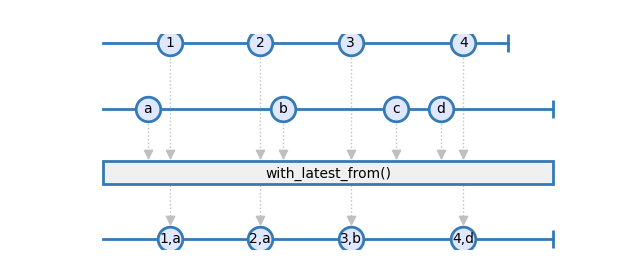
Examples
>>> obs = rx.with_latest_from(obs1) >>> obs = rx.with_latest_from([obs1, obs2, obs3])
- Parameters
sources (
Observable[Any]) – Sequence of observables.- Return type
Observable[Tuple[Any,...]]- Returns
An observable sequence containing the result of combining elements of the sources into a
tuple.
- reactivex.zip(*args)¶
Merges the specified observable sequences into one observable sequence by creating a
tuplewhenever all of the observable sequences have produced an element at a corresponding index.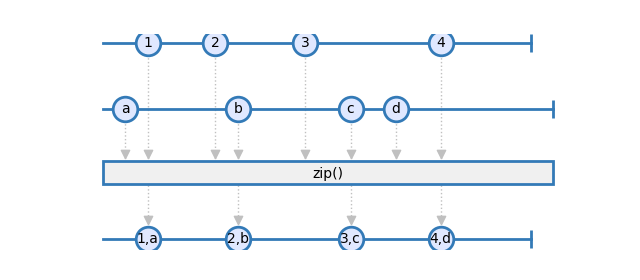
Example
>>> res = rx.zip(obs1, obs2)
- Parameters
args (
Observable[Any]) – Observable sources to zip.- Return type
Observable[Tuple[Any,...]]- Returns
An observable sequence containing the result of combining elements of the sources as a
tuple.